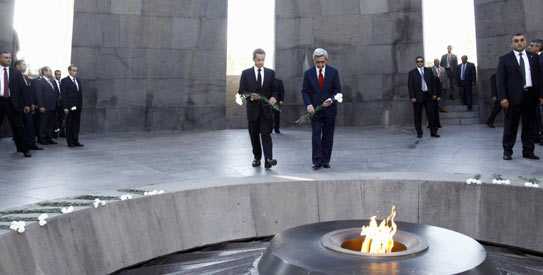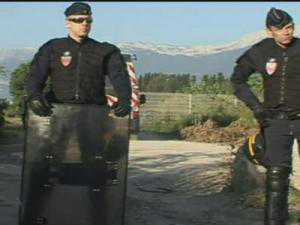* Sarkozy visits memorial to Armenian genocide
* Sarkozy to urge Georgia to mend ties with Russia
* Revives memories of mediating role over 2008 war (Adds Russia finalising military base deals)
By Emmanuel Jarry

YEREVAN, Oct 6 (Reuters) – French President Nicolas Sarkozy, on a brief trip to the Caucasus, urged Turkey on Thursday to recognize the 1915 massacre of Armenians as genocide, threatening to pass a law in France that would make denying this a crime.
Visiting a genocide memorial and museum in Yerevan, Armenia, with Armenian President Serzh Sarksyan, Sarkozy challenged Turkey — which is seeking membership of the European Union — to face up to its past.
“The Armenian genocide is a historical reality. Collective denial is even worse than individual denial,” Sarkozy told reporters.
“Turkey, which is a great country, would honour itself to revisit its history like other great countries in the world have done.”
Armenia was the first stop on a two-day trip to the region by Sarkozy, who is keen to raise his profile on the international stage before an April presidential election. He visits Azerbaijan and Georgia on Friday.
France is opposed to Turkey’s bid for EU membership and his comments on the sensitive subject are likely to be viewed as unwelcome meddling by Ankara.
Turkey denies the deaths of Armenians in 1915 was genocide. It says both Christian Armenians and Muslim Turks died in large numbers as the Ottoman empire collapsed.
Sarkozy suggested that the French parliament might consider a law making denial of the deaths of Armenians as genocide a crime, similar to the French law against Holocaust denial.
FROZEN CONFLICT
While in the region, Sarkozy will try to encourage Sarksyan and the president of Azerbaijan, Ilham Aliyev, to resolve a conflict over Nagorno-Karabakh, a mainly Armenian-populated enclave in Azerbaijan.
France plays a leading role in the Minsk Group of countries from the Organisation for Security and Co-operation in Europe (OSCE), which is trying to resolve the conflict in Nagorno-Karabakh.
Armenian-backed forces wrested Nagorno-Karabakh from Azeri control after the Soviet Union collapsed. When the conflict ended in a ceasefire in 1994, 30,000 people had been killed and about 1 million had been driven from their homes.
During a three-hour visit to Georgia, Sarkozy will also urge Georgia to improve relations with Russia, reviving memories of his mediating role when the two countries went to war in 2008.
Sarkozy’s success in brokering a ceasefire in that conflict guarantees a warm welcome in the capital Tbilisi, where he will meet President Mikheil Saakashvili and address a crowd in the central Freedom Square.
Sarkozy will urge Saakashvili to look beyond the countries’ differences, including over how they interpret the ceasefire terms, and rebuild trust in relations with Moscow.
Each side accuses the other of acting provocatively and sabotaging relations. Moscow has angered Tbilisi and the West by recognising Georgia’s breakaway Abkhazia and South Ossetia regions as independent states.
In Moscow on Thursday, Russian President Dmitry Medvedev met Abkhazia’s new president and signed legislation ratifying treaties that enable Russia to operate military bases in the two separatist regions for at least 49 years.
It was not clear whether Sarkozy would discuss Russia’s bid to join the World Trade Organization which Georgia, as a member, could block. Moscow hopes to complete its entry to the 153-member trading body this year.
HOPING TO BOOST RATINGS
Sarkozy mediated the 2008 ceasefire on behalf of the European Union as France held the bloc’s presidency at the time.
That ended the war over Abkhazia and South Ossetia, but Georgia says Russia has violated the terms by not withdrawing troops to the positions they held before the war.
TV images of Sarkozy addressing jubilant crowds will do him no harm as he tries to improve his poor ratings before the two-round election on April 22 and May 6. An opinion poll on Tuesday put Socialist Francois Hollande well in the lead.
Sarkozy will also promote business during his visit to the region but officials gave no details of any planned contracts.
French oil group Total said last month it had made a major gas discovery at Azerbaijan’s Absheron block in the Caspian Sea. French companies could also be in the running to help extend the Baku metro, or subway. (Reporting by Margarita Antidze in Tbilisi and Emmanuel Jarry in Paris, Writing by Timothy Heritage and Alexandria Sage; Editing by Myra MacDonald)
via UPDATE 2-Sarkozy challenges Turkey to face its history | Reuters.


